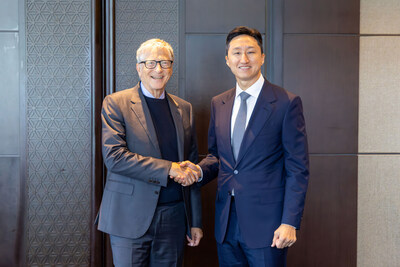
On Friday, August 22, HD Hyundai Executive Vice Chairman Chung Kisun met with TerraPower Chairman and Founder Bill Gates to discuss nuclear supply chain cooperation.
UPDATE: In a critical advancement for nuclear energy, HD Hyundai Executive Vice Chairman Chung Kisun met with Bill Gates, Chairman of TerraPower, in Seoul, South Korea on August 22, 2025. The leaders engaged in urgent discussions to enhance the nuclear supply chain and accelerate the commercialization of innovative Natrium reactors.
The meeting, held just five months after their initial talks in the U.S., is a significant step towards expanding global manufacturing capabilities for next-generation nuclear technology. Both parties are focused on realizing the full potential of Natrium reactors, which are designed to be safer and more efficient than traditional nuclear options.
During the meeting, they reviewed progress on supply chain expansion and confirmed plans to supply reactor vessels, a crucial element in the Natrium reactor framework. These reactors are recognized for their advanced safety features and lesser nuclear waste output—approximately 40% less compared to conventional reactors.
Chung emphasized the impact of this partnership, stating, “Next-generation SMR technology is a core solution for realizing sustainable future energy. Our collaboration with TerraPower will mark a turning point in building a global nuclear supply chain and advancing the energy paradigm shift.”
TerraPower’s innovative technology presents a promising future for nuclear energy, with the company poised to lead a market transformation. Chris Levesque, President and CEO of TerraPower, remarked, “HD Hyundai is a premier partner with deep manufacturing expertise essential for the nuclear industry’s evolution. Together, we aim to accelerate the commercialization of Natrium reactors and explore global market opportunities.”
This collaboration not only signals a robust partnership in nuclear technology but also highlights HD Hyundai’s commitment to developing nuclear-powered vessels, including potential applications for molten salt reactor (MSR) technologies in shipbuilding.
As the global energy landscape shifts towards sustainability, this meeting represents a pivotal moment in nuclear supply chain development, impacting energy policy and industrial collaboration worldwide.
Stay tuned for more updates as these developments unfold!





